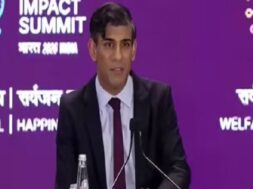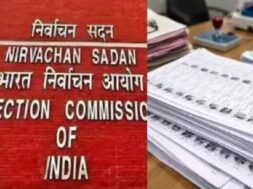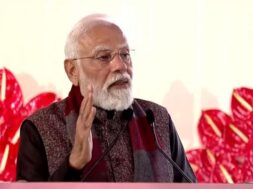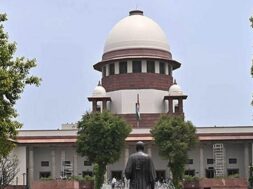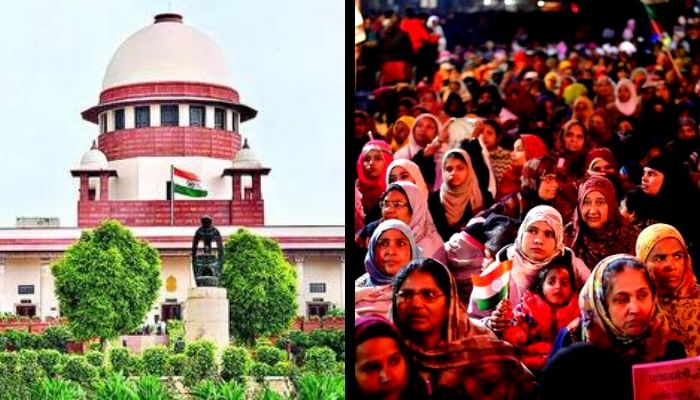
NEW DELHI, Feb 13: The Supreme Court refused to reconsider its October 7 judgement that the Shaheen Bagh protests against the Citizenship Amendment Act (CAA) was inconvenient for commuters and has reiterated that the constitutional guarantee of right to protest comes with some riders and there cannot be continued occupation of a public place in case of prolonged dissent or protest.
“The right to protest cannot be any time and everywhere. There may be some spontaneous protests but in case of prolonged dissent or protest, there cannot be continued occupation of public places affecting the rights of others,” a three-judge Bench led by Justice Sanjay Kishan Kaul said while dismissing the review petition.
“We have considered the earlier judicial pronouncements and recorded our opinion that the Constitutional scheme comes with a right to protest and express dissent but with an obligation to have certain duties. The right to protest cannot be anytime and everywhere. There may be some spontaneous protests but in case of prolonged dissent or protest, there cannot be continued occupation of a public place,” a Bench of Justices S K Kaul, Aniruddha Bose and Krishna Murari said in its February 9 order.
“We have perused the Review Petition and record of the Civil Appeal and are convinced that the order of which review has been sought, does not suffer from any error apparent warranting its reconsideration”, the Bench said.
The review hearing held in the judges’ chambers by circulation was published on Saturday. The Review Bench, which comprised the same judges who delivered the original judgment, said they did not find any “error apparent warranting reconsideration” in their verdict.
“We have considered the earlier judicial pronouncements and recorded our opinion that the constitutional scheme comes with a right to protest and express dissent but with an obligation to have certain duties,” the review order reasoned.
In its October 7 judgement in the matter, the Supreme Court while expressing its strong disapproval of the manner in which the protests against the CAA, 2019, were organised in the Shaheen Bagh area of the national capital had ruled that protests must be carried out “in designated areas alone” and “public ways and public spaces cannot be occupied.. and that too indefinitely”.
“…while appreciating the existence of the right to peaceful protest against a legislation… we have to make it unequivocally clear that public ways and public spaces cannot be occupied in such a manner and that too indefinitely,” the bench said while deciding petitions that had sought removal of the protesters for causing traffic chaos in areas in an around the national capital.
The bench said “democracy and dissent go hand in hand, but then the demonstrations expressing dissent have to be in designated places alone.”
The Shaheen Bagh protests, it had said, “was not even one of protests taking place in an undesignated area, but was a blockage of a public way which caused grave inconvenience to commuters” and added “we cannot accept the plea of the applicants (who had sought to intervene in the matter in defence of the protestors) that an indeterminable number of people can assemble whenever they choose to protest.”
“We have, thus, no hesitation in concluding that such kind of occupation of public ways, whether at the site in question or anywhere else for protests is not acceptable and the administration ought to take action to keep the areas clear of encroachments or obstructions,” said the Bench in its October 7 order which came on an appeal by Advocate Amit Sahni.
Advocate Sahni had first approached the Delhi High Court highlighting the closure of the Kalindi Kunj- Shaheen Bagh stretch, including the Okhla underpass from December 15, 2019, caused by the protest. Sahni contended that public roads could not be permitted to be encroached upon in this manner and sought a direction to clear the same.
The High Court, which heard the plea on January 14, 2019, disposed it the same day without any specific direction. The HC had said the Delhi Police had all the powers, jurisdiction and authority to control traffic in larger public interest wherever protests or agitations were going on and it was up to authorities to take a call based on the ground reality and the wisdom of the police, especially where situations may keep changing every 10 minutes.
The SC, however, said it is “of the view that the High Court should have monitored the matter rather than disposing of the Writ Petition and creating a fluid situation”.
The SC bench also ruled that there was no action or any negotiation from the part of the administration and this finally warranted its intervention.
(Manas Dasgupta)


